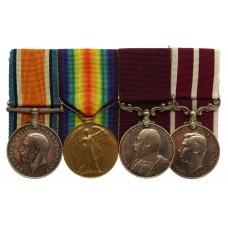WW1 British War Medal, Victory Medal, Edward VII LS&GC and George VI Meritorious Service Medal Group of Four - Colour Sergeant (later Captain) H. Baxter, 5th Bn. Essex Regiment
- Product Code: MM-5522
- Regiment: Essex Regiment
- Era: WW1 Availability: Out of Stock
-
Price: £575.00
A fine long time NCO and later Captain’s first world war pair, LS&GC and Meritorious Service Medal group awarded to Colour Sergeant (later Captain) Henry Baxter, 5th Battalion, Essex Regiment, who having enlisted into the 4th Battalion, Essex Regiment on 29th June 1887, would see 26 years service as a Sergeant Major and Instructor being discharged in 1913, but upon the outbreak of war immediately took back his role and later saw service as a Captain in the 5th Battalion, Essex Regiment on the Western Front aged 46.
British War Medal named to Capt. H. Baxter
WW1 Victory Medal named to Capt. H. Baxter
Edward VII Long Service & Good Conduct Medal named to 2176 C.Sjt. H. Baxter. Essex Regt
George VI Meritorious Service Medal named to 2176 C. Sjt. H. Baxter. Essex. R.
The medals are in good condition and are court mounted for wear.
Henry Baxter was born in Suffolk in 1869, and attested into the 4th Battalion, Essex Regiment on 29th June 1887 aged 18. Marrying Miss Elizabeth Irene Lemon eldest daughter of Mr Robert Lemon in mid-September 1909, for this he was gifted a marble clock and an illuminated address given by the Officer, N.C.O.’s and men of ‘G’ Company, he was further gifted a plated coffee service from the Officers and N.C.O.’s at the annual Prize distribution in Ongar in 1912. He had served for 26 years as an exemplary Sergeant Major and Instructor when he was discharged in 1913, immediately taking back his role a year later upon the outbreak of war, and is noted as commanding the new reserves on 21st August 1914 upon the mobilisation, a newspaper article appearing in the Chelmsford Chronicle on this date states:
‘Sergt Major Baxter first of all read a new order of the War Office allowing members of the National Reserve not over 42 years of age to enlist into reserve and extra reserve battalions. They would be attested as privates for one year, or for the duration of the war for general service. They would after attestation, be eligible for promotion, but no guarantee of future promotion could be given. Ex non-commissioned officers unwilling to agree to those conditions could not be accepted for service. Up to this order, said the Sergeant-Major, the National Reserve were required to fill the gaps and the deficiencies in the Territorial Force. Every unit in Essex was now up to strength. The Regular Army was also up to strength.
Sergt-Major Baxter then explained the use of the rifle to the reserves. Events in South Africa, he said, called attention to the need of reform in musketry methods. The chief cause of the change was in the introduction of smokeless powder, introduced a few years before that war broke out. The came khaki uniforms. In South Africa our officers were perplexed by the invisibility of the enemy, being unable to reply to the heavy fire which met them during the advances and overwhelmed by attacks from ambushed enemies who got away as soon as the y were discovered. Now the training in the Regular Army was up to very high standard of efficiency, all being due to that ‘void of the battlefield’. According to reports the Germans were fighting in close formation even now, and that would be very disastrous when they met soldiers trained to get under cover at once. Turning to the rifle, the lecturer said that for more than fifty years before the South African war broke out we were spending money lavishly on improvements to the rifle, only to find that on the battlefield of the veldt our standard of accuracy was entirely false and misleading. Since then the Government had been trying to educate both the officer and the soldier. But the rifle was beyond us.'
He arrived in France on 15th September 1917 seeing service on the Western Front having been noted a Lieutenant (Temporary Major) in the Essex Newsman of 25th November 1916, and then appointed a Captain in the 5th Battalion, Essex Regiment aged 46.
We take great pride in our stock and will always strive to bring you genuine items. All our items are carefully checked to make sure they are authentic original pieces.
Having worked in the field for many years we appreciate that there can occasionally be differences of opinion. This is why we have a no quibble returns policy on ALL items. If you want to return any purchase, for whatever reason, we will issue a full refund including your postage costs.
PAYMENT:
We accept payment by:
Credit and debit cards
Cash (any currency)
U.K. postal orders
Sterling cheques
PayPal
Exchange of goods
SHIPPING:
Our standard shipping costs apply on almost all of our items. The prices are as follows:
UK Standard Delivery - £3.45
UK Special Delivery - £9.95
Europe Priority Airmail - £10.95
Rest of World Priority Airmail - £11.95
Some large/heavy items may incur extra shipping costs. This will be clearly marked in the description and all prices will be shown before any payment is taken.
For more information on payment and shipping please click here
Tags: WW1 Medals, First World War, WWI, World War One, Military Medals, Campaign Medals, British Medals, MSM, LSGC, Long Service Medals, Essex Regiment


























-74x74.jpg)
